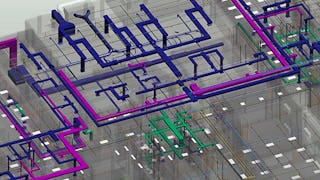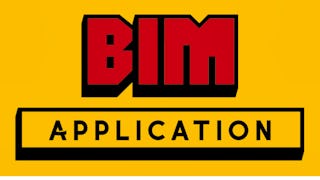- Browse
- Bim
BIM Courses
BIM courses can help you learn 3D modeling, project visualization, and collaborative design techniques. You can build skills in construction documentation, clash detection, and lifecycle management. Many courses introduce tools like Revit, Navisworks, and AutoCAD, showing how these applications streamline workflows and enhance communication among stakeholders in architecture, engineering, and construction projects.
Popular BIM Courses and Certifications
 Status: PreviewPreviewN
Status: PreviewPreviewNNational Taiwan University
Skills you'll gain: Building Information Modeling, Data Modeling, 3D Modeling, Computer-Aided Design, Construction, Engineering Practices, Construction Management, Civil Engineering, Mechanical Engineering
4.7·Rating, 4.7 out of 5 stars2K reviewsBeginner · Course · 1 - 3 Months
 Status: Free TrialFree TrialL
Status: Free TrialFree TrialLL&T EduTech
Skills you'll gain: Autodesk Revit, Design Reviews, Building Information Modeling, Visualization (Computer Graphics), Construction Management, Augmented and Virtual Reality (AR/VR), Construction, Construction Engineering, Commercial Construction, Engineering Analysis, Construction Estimating, Emerging Technologies, Civil and Architectural Engineering, Architectural Engineering, Drafting and Engineering Design, Coordination, Computer-Aided Design, Structural Engineering, As-Built Drawings, Engineering Documentation
4.5·Rating, 4.5 out of 5 stars145 reviewsIntermediate · Specialization · 3 - 6 Months
 Status: Free TrialFree TrialL
Status: Free TrialFree TrialLL&T EduTech
Skills you'll gain: Autodesk Revit, Building Information Modeling, Architectural Engineering, Drafting and Engineering Design, Computer-Aided Design, Engineering Documentation, Architectural Design, 3D Modeling, Facility Management, Civil Engineering, Structural Engineering, Technical Standard, HVAC, Electrical Systems, Plumbing, User Interface (UI)
4.5·Rating, 4.5 out of 5 stars109 reviewsIntermediate · Course · 1 - 3 Months
 Status: Free TrialFree TrialL
Status: Free TrialFree TrialLL&T EduTech
Skills you'll gain: Design Reviews, Autodesk Revit, Building Information Modeling, Visualization (Computer Graphics), Augmented and Virtual Reality (AR/VR), Engineering Analysis, Architectural Engineering, Coordination, Structural Engineering, Construction Management, Construction, Technical Standard
4.6·Rating, 4.6 out of 5 stars36 reviewsIntermediate · Course · 1 - 3 Months
 Status: PreviewPreviewN
Status: PreviewPreviewNNational Taiwan University
Skills you'll gain: Autodesk Revit, Building Information Modeling, AutoCAD, Construction Estimating, Simulation and Simulation Software, 3D Modeling, Construction Management, Data Integration
4.7·Rating, 4.7 out of 5 stars526 reviewsIntermediate · Course · 1 - 3 Months
 Status: Free TrialFree TrialC
Status: Free TrialFree TrialCColumbia University
Skills you'll gain: Project Schedules, Construction Management, Construction Estimating, Project Finance, Cost Estimation, Punch Work, Construction, Project Risk Management, Bidding, Building Information Modeling, Scheduling, Cost Control, Environment Health And Safety, Project Closure, Lean Methodologies, Timelines, Real Estate, Finance, Business Transformation, Innovation
4.7·Rating, 4.7 out of 5 stars9.7K reviewsBeginner · Specialization · 3 - 6 Months
What brings you to Coursera today?
 Status: Free TrialFree TrialC
Status: Free TrialFree TrialCColumbia University
Skills you'll gain: Construction Management, Construction, Building Information Modeling, Environment Health And Safety, Project Schedules, Lean Methodologies, Work Breakdown Structure, Project Management, Project Management Life Cycle, Sustainability Standards, Contract Management, Project Scoping, Project Planning, Risk Management
4.8·Rating, 4.8 out of 5 stars7.3K reviewsBeginner · Course · 1 - 3 Months
 Status: PreviewPreview
Status: PreviewPreviewSkills you'll gain: Autodesk Revit, Building Information Modeling, Document Management, Construction, Engineering Documentation, Architectural Drawing, Project Coordination, Computer-Aided Design, Digital Transformation, Architectural Design, Construction Management, Collaboration, 3D Modeling, Data Modeling, Coordination, Visualization (Computer Graphics), Data Visualization
4.2·Rating, 4.2 out of 5 stars16 reviewsBeginner · Course · 1 - 4 Weeks
 Status: Free TrialFree TrialN
Status: Free TrialFree TrialNNational Taiwan University
Skills you'll gain: Engineering Drawings, Architectural Drawing, AutoCAD, Autodesk Revit, SketchUp (3D Modeling Software), Building Information Modeling, Drafting and Engineering Design, 3D Modeling, Mechanical Drawings, Computer-Aided Design, Technical Drawing, Construction Estimating, Engineering Design Process, Architectural Engineering, Visualization (Computer Graphics), Structural Engineering, Civil and Architectural Engineering, Engineering Management, Civil Engineering, Blueprint Reading
4.7·Rating, 4.7 out of 5 stars359 reviewsBeginner · Specialization · 3 - 6 Months
 Status: Free TrialFree TrialL
Status: Free TrialFree TrialLL&T EduTech
Skills you'll gain: Building Information Modeling, Construction Management, Construction, Construction Engineering, Autodesk Revit, Commercial Construction, Construction Estimating, Emerging Technologies, Civil and Architectural Engineering, Architectural Engineering, As-Built Drawings, Facility Management, Cloud Computing, Cost Estimation, 3D Modeling, Document Management, Visualization (Computer Graphics), Internet Of Things, Digital Transformation, Coordination
4.7·Rating, 4.7 out of 5 stars29 reviewsIntermediate · Course · 1 - 3 Months
 Status: NewNew
Status: NewNewSkills you'll gain: SketchUp (3D Modeling Software), AutoCAD, Architectural Drawing, 3D Modeling, 3D Assets, Visualization (Computer Graphics), UI Components, Data Import/Export
Beginner · Course · 1 - 4 Weeks
 Status: Free TrialFree TrialU
Status: Free TrialFree TrialUUniversity of Colorado Boulder
Skills you'll gain: User Story, Supplier Management, Project Schedules, Project Closure, Engineering Management, Milestones (Project Management), Team Leadership, Stakeholder Management, Scheduling, Agile Project Management, Scrum (Software Development), Procurement, Quality Management, Team Management, Project Planning, Agile Methodology, Project Scoping, Project Management, Risk Management, Stakeholder Communications
Build toward a degree
4.7·Rating, 4.7 out of 5 stars1.5K reviewsBeginner · Specialization · 1 - 3 Months
In summary, here are 10 of our most popular bim courses
- BIM Fundamentals for Engineers: National Taiwan University
- Building Smarter: BIM in Practice: L&T EduTech
- BIM Fundamentals for Engineers: L&T EduTech
- BIM Coordination: L&T EduTech
- BIM Application for Engineers: National Taiwan University
- Construction Management: Columbia University
- Construction Project Management: Columbia University
- BIM Fundamentals: Smarter Building Design & Planning: Coursera
- CAD/BIM技術與應用: National Taiwan University
- Field BIM: L&T EduTech
Frequently Asked Questions about Bim
Building Information Modeling (BIM) is a digital representation of the physical and functional characteristics of a facility. It is a collaborative process that involves creating and managing information throughout a project's lifecycle, from planning and design to construction and operation. BIM is important because it enhances efficiency, reduces errors, and improves communication among stakeholders, leading to better project outcomes. By integrating various aspects of a project into a single model, BIM allows for better visualization and analysis, ultimately contributing to smarter building practices.
Careers in BIM are diverse and can be found across various sectors, particularly in architecture, engineering, and construction. Some common job titles include BIM Manager, BIM Coordinator, BIM Technician, and Project Manager. These roles often involve overseeing the BIM process, ensuring that models are accurate and up-to-date, and facilitating collaboration among team members. With the increasing adoption of BIM in the industry, there are also opportunities in consulting and training, as organizations seek to enhance their capabilities in this area.
To succeed in BIM, you need a mix of technical and soft skills. Key technical skills include proficiency in BIM software such as Autodesk Revit, Navisworks, and ArchiCAD. Understanding building design principles, construction processes, and project management is also essential. Additionally, soft skills like communication, teamwork, and problem-solving are crucial, as BIM is inherently collaborative. Familiarity with data management and visualization tools can further enhance your capabilities in this field.
There are several excellent online courses to help you learn BIM. For a comprehensive introduction, consider the BIM Fundamentals for Engineers course, which covers essential concepts and tools. If you're looking to apply BIM in practical scenarios, the BIM Application for Engineers course is a great choice. For those interested in coordination aspects, the BIM Coordination course provides valuable insights into managing collaborative workflows.
Yes. You can start learning BIM on Coursera for free in two ways:
- Preview the first module of many bim courses at no cost. This includes video lessons, readings, graded assignments, and Coursera Coach (where available).
- Start a 7-day free trial for Specializations or Coursera Plus. This gives you full access to all course content across eligible programs within the timeframe of your trial.
If you want to keep learning, earn a certificate in BIM, or unlock full course access after the preview or trial, you can upgrade or apply for financial aid.
Learning BIM can be approached through various methods. Start by enrolling in online courses that fit your learning style and schedule. Engage with interactive content, participate in discussions, and complete hands-on projects to reinforce your understanding. Additionally, consider joining professional networks or forums to connect with industry experts and peers. Practical experience through internships or collaborative projects can also enhance your learning and provide real-world context.
BIM courses typically cover a range of topics, including the fundamentals of BIM, software training, project lifecycle management, and collaboration techniques. You may also explore advanced topics such as 4D and 5D BIM, which incorporate scheduling and cost management into the modeling process. Other areas of focus can include sustainability practices, regulatory compliance, and the integration of BIM with other technologies like GIS and IoT.
For training and upskilling employees in BIM, courses like the Building Smarter: BIM in Practice Specialization are particularly beneficial. This specialization provides a comprehensive overview of BIM applications in real-world scenarios. Additionally, the BIM Fundamentals: Smarter Building Design & Planning course offers insights into effective design and planning strategies, making it suitable for workforce development.










